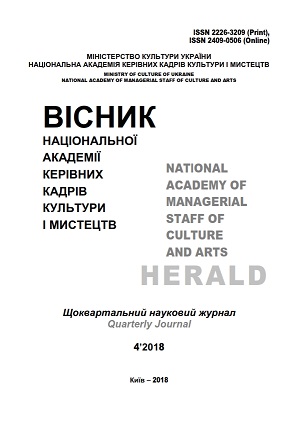Musical Component in the “Rites of Passage” of Hutsul Family Cycle: On Means and Forms of “Being Moduses” Implementation in the Traditional Culture
Musical Component in the “Rites of Passage” of Hutsul Family Cycle: On Means and Forms of “Being Moduses” Implementation in the Traditional Culture
Author(s): Olha Igorivna KolomyyetsSubject(s): Customs / Folklore, Music, Culture and social structure , Sociology of Culture, Sociology of Art
Published by: Національна академія керівних кадрів культури і мистецтв
Keywords: Hutsul tradition; family rites; ritual drama; funeral and wedding music; lamenting (“prykazuvanie”), floyera and trembita playing;
Summary/Abstract: The purpose of the article deals with the music component of two significant “rites of passage” in Hutsul tradition – funeral and wedding rituals. It also studies the music performers’ role in these two ritual drama as well as genre system of their musical repertoire. Research methodology is based on the systematic comparison of two musical and ethnographic phenomena. It also involves generalizing approach in discovering available published and archive materials as well as transcriptional and analytical methods in describing the data recorded during the author’s personal fieldwork. The scientific novelty lies in revealing the system of music functioning in the Hutsul “rites of passage” of family cycle, namely its role, time and purpose of performing, as well as musical genres and forms performed. The novelty is also demonstrated in dealing with the “funeral rite issues”, which have not received significant attention in many areas of research including musical culture. The main conclusions of study are as follows: music plays a very important role in both wedding and funeral rites; in both rites the performers are regular participants and play the role of “spokespersons” and “means of mediation” during the main participants’ passage from one state of being to the other. Musical repertoire of two ritual drama consists of both vocal and instrumental music, which makes them similar, but at the same time they are different due to the heterogeneity of genre cycles and emphasis on some particular genre or genres.
Journal: Вісник Національної академії керівних кадрів культури і мистецтв
- Issue Year: 2018
- Issue No: 4
- Page Range: 281-285
- Page Count: 5
- Language: English

